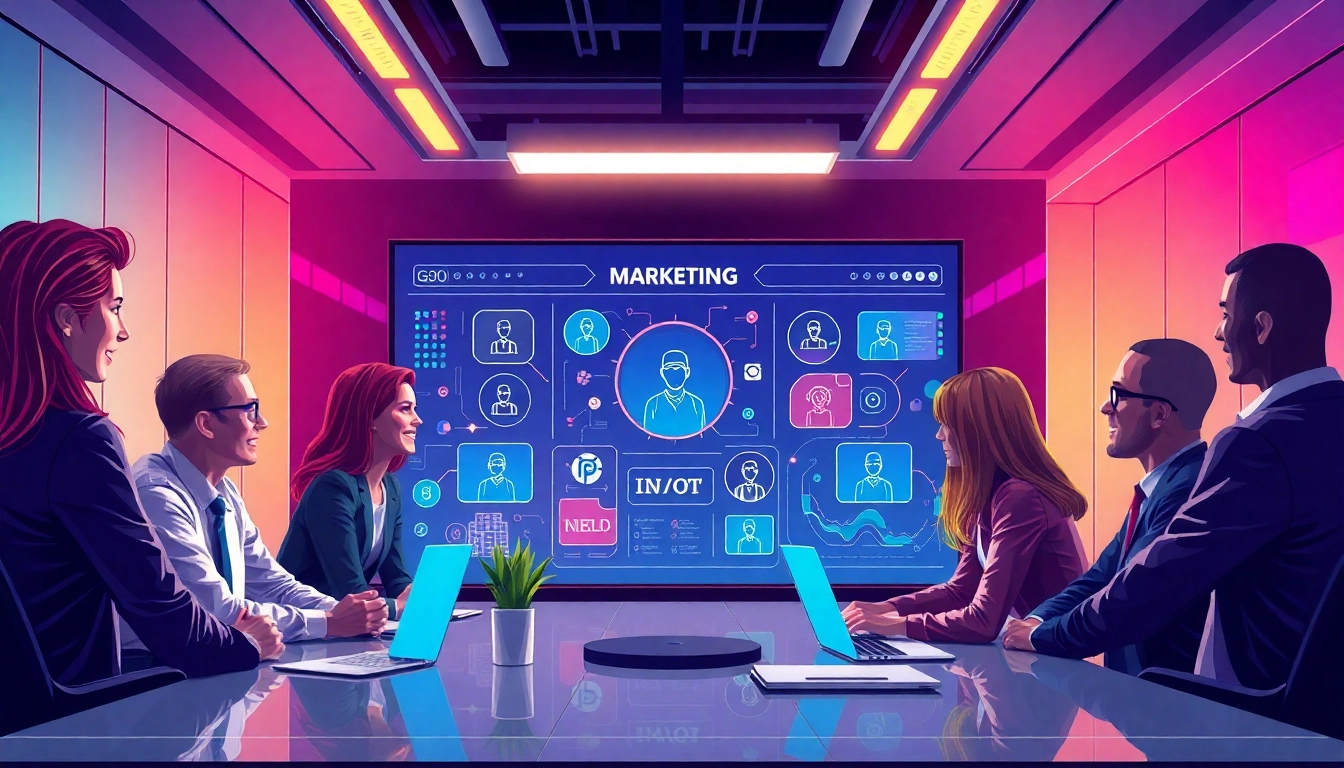Understanding AI Marketing Agents
Definition and Functionality
AI marketing agents are sophisticated software programs designed to utilize artificial intelligence (AI) technologies to enhance various marketing tasks and processes. These agents can automate a multitude of functions ranging from data analysis and customer interaction to content creation and campaign optimization. Essentially, they serve as virtual assistants for marketers, executing tasks autonomously while significantly reducing the time and resources required.
By leveraging algorithms and machine learning models, AI marketing agents can analyze vast amounts of data to draw insights, target specific audiences, and optimize marketing strategies. Their ability to process information at unprecedented speeds allows marketers to focus on high-level strategy and creative thinking instead of mundane tasks.
Evolution of AI in Marketing
AI’s presence in marketing has evolved dramatically over the last decade. Initially, organizations began harnessing AI for simple tasks such as automating email responses and conducting basic data analysis. However, as technology has advanced, AI marketing agents have become increasingly sophisticated. The introduction of natural language processing (NLP) and machine learning has allowed for enhanced customer interactions, such as chatbots capable of engaging users in real-time conversations.
Today, AI marketing agents can personalize marketing messages at scale, dynamically adjusting content based on user behavior and preferences. The integration of AI into marketing has transformed traditional practices, allowing for more efficient targeting, increased customer engagement, and ultimately, better conversion rates.
Benefits of Incorporating AI Agents
Integrating AI marketing agents into marketing operations offers numerous benefits, including:
- Enhanced Efficiency: AI agents automate repetitive tasks, freeing up marketers to focus on strategic initiatives.
- Data-Driven Insights: They analyze large datasets to unearth valuable insights, enabling informed decision-making.
- Improved Customer Engagement: AI agents provide personalized interactions with customers, fostering stronger relationships.
- Scalability: They can easily scale marketing efforts across various channels without a proportional increase in resources.
- Cost-Effectiveness: Businesses can reduce operational costs by minimizing the need for human input in routine tasks.
Types of AI Marketing Agents
Chatbots and Customer Interaction Agents
Chatbots are perhaps the most recognized type of AI marketing agent, designed to simulate human-like conversations with users. They are employed on websites, social media platforms, and messaging apps to provide instant responses to customer queries. This enhances user experience by offering assistance 24/7, answering FAQs, and even guiding users through the sales process.
Customer interaction agents utilize AI to process natural language, understand user intent, and provide contextually relevant responses. They can learn and adapt over time, becoming more effective in handling diverse customer interactions and improving overall satisfaction rates.
Predictive Analytics Tools
Predictive analytics tools utilize historical data and machine learning algorithms to forecast customer behavior and market trends. By analyzing patterns within vast datasets, these tools can predict future actions, enabling marketers to tailor their strategies accordingly. This can include anticipating customer needs, optimizing inventory, and improving targeted advertising campaigns.
For instance, predictive analytics can help identify which customers are most likely to convert, allowing businesses to focus their efforts on high-potential leads. This data-driven approach ensures that marketing resources are allocated efficiently, maximizing return on investment.
Content Creation and Management Agents
Content creation agents are increasingly being employed to generate various types of content, from blog posts to social media updates. Utilizing natural language generation (NLG) technologies, these AI agents can produce high-quality written content based on predefined topics and data inputs.
Furthermore, content management agents assist in optimizing and distributing content across various platforms. They analyze audience engagement metrics to determine the most effective distribution channels, topics, and formats, ensuring that the right content reaches the right audience at the right time.
Implementing AI Marketing Agents
Choosing the Right Solutions for Your Business
Selecting the appropriate AI marketing agents necessitates a thorough understanding of your business needs and objectives. Businesses should evaluate various AI solutions based on factors like functionality, usability, integration capabilities, and cost. It’s essential to consider whether the solution can effectively address current pain points, such as enhancing customer engagement or streamlining data analysis.
Moreover, assessing the vendor’s reputation, customer support, and service offerings can provide insights into their reliability. Conducting trials or demos can also offer tangible insights into how the AI agents function in practice before full implementation.
Integrating AI with Existing Marketing Tools
Successful implementation of AI marketing agents requires seamless integration with existing marketing tools and platforms. Many businesses utilize a range of systems for customer relationship management (CRM), email marketing, and analytics. Ensuring compatibility and smooth data flow between these tools and the AI agents is critical for maximizing their effectiveness.
To facilitate this integration, organizations may require the assistance of IT professionals or consultants who specialize in marketing technology. Additionally, customizing AI solutions to align with specific marketing workflows can enhance overall performance and yield better results.
Staff Training and Adoption
For AI marketing agents to be effective, staff must be trained on how to use them effectively. This involves educating team members about the capabilities of the AI agents, how to interpret their insights, and how to respond to the data produced. Additionally, fostering a culture of data-driven decision-making within the marketing team can ensure that the agents are utilized to their full potential.
Regular training sessions and workshops can help staff stay updated with the latest features and improvements in AI technologies. Encouraging feedback from users can also provide insights into areas for improvement and application enhancements.
Measuring the Impact of AI Marketing Agents
Key Performance Indicators to Track
To assess the effectiveness of AI marketing agents, businesses should establish clear key performance indicators (KPIs) that align with their marketing goals. Common KPIs include conversion rates, customer acquisition costs, engagement rates, and customer satisfaction scores. Tracking these metrics over time can provide insights into performance improvements and highlight areas for further optimization.
Additionally, analyzing the return on investment (ROI) for AI marketing initiatives can quantify the financial benefits incurred from these technologies. This data not only helps in evaluating success but also offers a foundation for justifying continued investments in AI marketing solutions.
Case Studies and Success Stories
Examining real-world case studies can provide valuable insights into the successful implementation of AI marketing agents. For instance, a well-known retail brand utilized predictive analytics to optimize its inventory and promotional strategies, resulting in a 20% increase in sales within six months. Through careful analysis of customer purchasing behavior, they were able to align their marketing efforts precisely with market demand.
Moreover, companies that have integrated chatbots into their customer service systems report enhanced customer satisfaction scores and reduced response times, leading to improved user experiences. Highlighting such success stories can inspire confidence among stakeholders and motivate others to adopt AI marketing agents.
Continuous Improvement and Optimization
The marketing landscape is ever-evolving, and maintaining a competitive edge requires continuous evaluation and optimization of AI marketing agents. Regularly analyzing performance metrics and customer feedback can pinpoint areas for improvement. Moreover, staying attuned to technological advancements in AI can help organizations adapt and leverage new capabilities that enhance marketing outcomes.
Organizations should establish a systematic review process to evaluate the performance of their AI agents periodically and make adjustments as necessary. This proactive approach ensures that AI marketing agents remain effective and aligned with the organization’s evolving goals.
The Future of Marketing with AI Agents
Emerging Trends and Technologies
As the field of AI continues to expand, several emerging trends are set to shape the future of marketing with AI agents. For instance, the integration of AI with augmented reality (AR) is beginning to transform the customer experience, enabling hyper-personalized marketing that enhances user engagement. Similarly, advancements in NLP are making AI agents more adept at understanding and generating human-like responses, which can significantly improve customer interactions.
Moreover, the rise of the Internet of Things (IoT) will present new opportunities for AI marketing agents, allowing for real-time data collection and analysis across various devices, leading to even more precise targeting and personalization.
Challenges and Ethical Considerations
While the benefits of AI marketing agents are plentiful, there are also notable challenges and ethical considerations. Data privacy concerns are paramount, as organizations must ensure compliance with regulations (like GDPR) and protect customer data from breaches. Transparency in how AI agents make decisions is essential to maintain customer trust. Ethical AI practices should be adopted to avoid biases in data processing or customer targeting, ensuring that all user interactions are fair and respectful.
Organizations must also consider the human aspect of marketing and ensure that AI tools enhance rather than replace human creativity and intuition. Striking the right balance between automation and human oversight is crucial for cultivating lasting customer relationships.
Preparing for a Data-Driven Marketing Era
To thrive in an increasingly data-driven marketing landscape, businesses must foster a culture that values data literacy and encourages innovation. Preparing for this era involves investing in technology, training staff to leverage the latest tools effectively, and adopting a mindset that embraces continuous learning and adaptation.
Companies should prioritize strategies that valorize real-time data analysis, enabling them to pivot their marketing strategies based on up-to-date insights. As the capabilities of AI marketing agents evolve, organizations that incorporate these practices will position themselves for sustained success in the future digital landscape.



